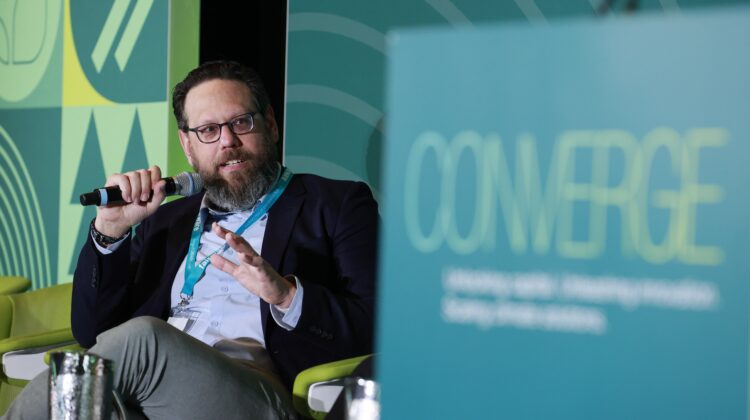
The B.C. Centre for Innovation and Clean Energy (CICE) hosted their annual CONVERGE conference today in Vancouver and it opened with a thought-provoking discussion on the future of climate technology and the financial and structural challenges that come with scaling solutions for a net-zero world.
Sarah Goodman, President and CEO of CICE, sat down with Jonah Goldman of Generate Capital for a wide-ranging conversation that included the inadequacy of traditional financing models, the critical importance of commercialization, and the need for robust collaboration between public and private sectors.
Jonah Goldman is the Head of External Affairs and Impact at Generate Capital, where he oversees communications, government engagement, and impact assessment and strategy.
Prior to joining Generate Capital, Goldman led Breakthrough Energy, a network founded by Bill Gates that includes investment funds, nonprofit and philanthropic programs, and policy efforts aimed at scaling technologies needed to achieve net-zero emissions by 2050.
“Green Premiums” and the Financing Gap
One of Goldman’s central points was the concept of the “green premium”—the additional cost often associated with adopting sustainable technologies over traditional ones. Goldman argued that these premiums are an unavoidable reality for many climate solutions, particularly in asset-heavy sectors such as steel, concrete, and hydrogen.
“Some of these technologies will never eliminate that premium,” he noted. “Most often, that premium will have to be absorbed by public payers or innovative market mechanisms. The question is: how do we create financing models that reflect this reality and still allow these technologies to scale?”
He emphasized that while philanthropic and impact capital can help address early-stage funding gaps, achieving global scalability requires mechanisms that integrate public subsidies, private investment, and consumer engagement.
The Importance of Commercialization and “Steel in the Ground”
Goldman stressed that many startups in the climate space overlook the importance of early commercialization strategies. He repeatedly referred to the necessity of getting “steel in the ground,” a term he used to signify tangible progress in building projects and infrastructure.
“Climate tech is not like software or biotech. It’s an asset-heavy, project-intensive business,” he said. “From day one, entrepreneurs need to think about project finance, customer relationships, and how their solutions will scale in the real world.”
For Goldman, the ability to demonstrate commercial viability early in a company’s lifecycle is critical to attracting both public and private investment. “Every company will face the moment when they realize they need to commercialize sooner than expected,” he warned. “Planning for that moment from the beginning is essential.”
A Call for Collaboration
Goldman also called for deeper collaboration between governments, investors, and entrepreneurs to address the unprecedented scale of the climate challenge. He pointed to the historical reliance of industries like fossil fuels on public capital and policy incentives as a model for how clean technologies can grow.
“The fossil fuel industry didn’t succeed in isolation,” Goldman said. “It’s absurd to think we can decarbonize the global economy without a similar alignment of public and private interests.”
He praised regions like British Columbia and the U.S. West Coast for their leadership in creating policy and funding environments conducive to innovation. However, he cautioned that more must be done to align capital with climate goals, particularly for technologies with long timelines and high upfront costs.
Optimism for the Future
Despite the challenges, Goldman expressed cautious optimism about the trajectory of climate technology. Reflecting on the progress since the Paris Agreement, he highlighted the increasing number of startups and established players bringing viable solutions to market.
“We’ve solved every problem as a species that has ever presented itself to us,” he said. “Maybe we can’t solve this one, but I think we should still bet on us.”
As the world grapples with the urgency of climate change, Goldman’s insights underscore the critical importance of integrating innovation, financing, and collaboration. For attendees at CICE’s Converge conference, his message was clear: tackling the climate crisis will require both bold thinking and a grounded, practical approach to building the future.


